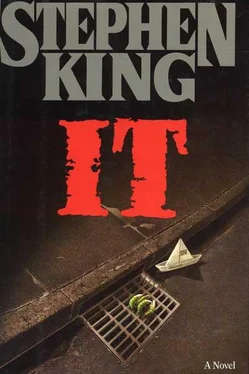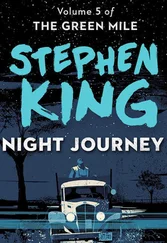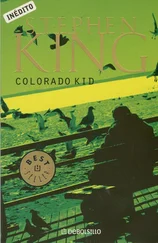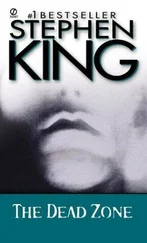Stephen King - It
Здесь есть возможность читать онлайн «Stephen King - It» весь текст электронной книги совершенно бесплатно (целиком полную версию без сокращений). В некоторых случаях можно слушать аудио, скачать через торрент в формате fb2 и присутствует краткое содержание. Год выпуска: 1986, Жанр: Ужасы и Мистика, на английском языке. Описание произведения, (предисловие) а так же отзывы посетителей доступны на портале библиотеки ЛибКат.
- Название:It
- Автор:
- Жанр:
- Год:1986
- ISBN:нет данных
- Рейтинг книги:4.33 / 5. Голосов: 3
-
Избранное:Добавить в избранное
- Отзывы:
-
Ваша оценка:
- 80
- 1
- 2
- 3
- 4
- 5
It: краткое содержание, описание и аннотация
Предлагаем к чтению аннотацию, описание, краткое содержание или предисловие (зависит от того, что написал сам автор книги «It»). Если вы не нашли необходимую информацию о книге — напишите в комментариях, мы постараемся отыскать её.
It — читать онлайн бесплатно полную книгу (весь текст) целиком
Ниже представлен текст книги, разбитый по страницам. Система сохранения места последней прочитанной страницы, позволяет с удобством читать онлайн бесплатно книгу «It», без необходимости каждый раз заново искать на чём Вы остановились. Поставьте закладку, и сможете в любой момент перейти на страницу, на которой закончили чтение.
Интервал:
Закладка:
Stephen King
It
This book is gratefully dedicated to my children. My mother and my wife taught me how to be a man. My children taught me how to be free.
NAOMI RACHEL KING, at fourteen;
JOSEPH HILLSTROM KING, at twelve;
OWEN PHILIP KING, at seven.
Kids, fiction is the truth inside the lie, and the truth of this fiction is simple enough: the magic exists.
S.K.“This old town been home long as I remember This town gonna be here long after I’m gone. East side west side take a close look “round her You been down but you’re still in my bones.”
–The Michael Stanley Band“Old friend, what are you looking for?
After those many years abroad you come
With images you tended
Under foreign skies
Far away from your own land.”
–George Seferis“Out of the blue and into the black.”
–Neil YoungPart 1
THE SHADOW BEFORE
“They begin!
The perfections are sharpened
The flower spreads its colored petals
wide in the sun
But the tongue of the bee
misses them
They sink back into the loam
crying out
–you may call it a cry
that creeps over them, a shiver
as they wilt and disappear…”
–William Carlos Williams, Paterson“Born down in a dead man’s town”
–Bruce SpringsteenChapter 1
AFTER THE FLOOD (1957)
1
The terror, which would not end for another twenty-eight years-if it ever did end-began, so far as I know or can tell, with a boat made from a sheet of newspaper floating down a gutter swollen with rain.
The boat bobbed, listed, righted itself again, dived bravely through treacherous whirlpools, and continued on its way down Witcham Street toward the traffic light which marked the intersection of Witcham and Jackson. The three vertical lenses on all sides of the traffic light were dark this afternoon in the fall of 1957, and the houses were all dark, too. There had been steady rain for a week now, and two days ago the winds had come as well. Most sections of Derry had lost their power then, and it was not back on yet.
A small boy in a yellow slicker and red galoshes ran cheerfully along beside the newspaper boat. The rain had not stopped, but it was finally slackening. It tapped on the yellow hood of the boy’s slicker, sounding to his ears like rain on a shed roof… a comfortable, almost cozy sound. The boy in the yellow slicker was George Denbrough. He was six. His brother, William, known to most of the kids at Derry Elementary School (and even to the teachers, who would never have used the nickname to his face) as Stuttering Bill, was at home, hacking out the last of a nasty case of influenza. In that autumn of 1957, eight months before the real horrors began and twenty-eight years before the final showdown, Stuttering Bill was ten years old.
Bill had made the boat beside which George now ran. He had made it sitting up in bed, his back propped against a pile of pillows, while their mother played Fur Elise on the piano in the parlor and rain swept restlessly against his bedroom window.
About three-quarters of the way down the block as one headed toward the intersection and the dead traffic light, Witcham Street was blocked to motor traffic by smudgepots and four orange sawhorses. Stencilled across each of the horses was DERRY DEPT. OF PUBLIC WORKS. Beyond them, the rain had spilled out of gutters clogged with branches and rocks and big sticky piles of autumn leaves. The water had first pried fingerholds in the paving and then snatched whole greedy handfuls-all of this by the third day of the rains. By noon of the fourth day, big chunks of the street’s surface were boating through the intersection of Jackson and Witcham like miniature white-water rafts. By that time, many people in Derry had begun to make nervous jokes about arks. The Public Works Department had managed to keep Jackson Street open, but Witcham was impassable from the sawhorses all the way to the center of town.
But, everyone agreed, the worst was over. The Kenduskeag Stream had crested just below its banks in the Barrens and bare inches below the concrete sides of the Canal which channelled it tightly as it passed through downtown. Right now a gang of men-Zack Denbrough, George’s and Bill’s father, among them-were removing the sandbags they had thrown up the day before with such panicky haste. Yesterday overflow and expensive flood damage had seemed almost inevitable. God knew it had happened before-the flooding in 1931 had been a disaster which had cost millions of dollars and almost two dozen lives. That was a long time ago, but there were still enough people around who remembered it to scare the rest. One of the flood victims had been found twenty-five miles east, in Bucksport. The fish had eaten this unfortunate gentleman’s eyes, three of his fingers, his penis, and most of his left foot. Clutched in what remained of his hands had been a Ford steering wheel.
Now, though, the river was receding, and when the new Bangor Hydro dam went in upstream, the river would cease to be a threat. Or so said Zack Denbrough, who worked for Bangor Hydroelectric. As for the rest-well, future floods could take care of themselves. The thing was to get through this one, to get the power back on, and then to forget it. In Derry such forgetting of tragedy and disaster was almost an art, as Bill Denbrough would come to discover in the course of time.
George paused just beyond the sawhorses at the edge of a deep ravine that had been cut through the tar surface of Witcham Street. This ravine ran on an almost exact diagonal. It ended on the far side of the street, roughly forty feet farther down the hill from where he now stood, on the right. He laughed aloud-the sound of solitary, childish glee a bright runner in that gray afternoon-as a vagary of the flowing water took his paper boat into a scale-model rapids which had been formed by the break in the tar. The urgent water had cut a channel which ran along the diagonal, and so his boat travelled from one side of Witcham Street to the other, the current carrying it so fast that George had to sprint to keep up with it. Water sprayed out from beneath his galoshes in muddy sheets. Their buckles made a jolly jingling as George Denbrough ran toward his strange death. And the feeling which filled him at that moment was clear and simple love for his brother Bill… love and a touch of regret that Bill couldn’t be here to see this and be a part of it. Of course he would try to describe it to Bill when he got home, but he knew he wouldn’t be able to make Bill see it, the way Bill would have been able to make him see it if their positions had been reversed. Bill was good at reading and writing, but even at his age George was wise enough to know that wasn’t the only reason why Bill got all A’s on his report cards, or why his teachers liked his compositions so well. Telling was only part of it. Bill was good at seeing.
The boat nearly whistled along the diagonal channel, just a page torn from the Classified section of the Derry News, but now George imagined it as a FT boat in a war movie, like the ones he sometimes saw down at the Derry Theater with Bill at Saturday matinees. A war picture with John Wayne fighting the Japs. The prow of the newspaper boat threw sprays of water to either side as it rushed along, and then it reached the gutter on the left side of Witcham Street. A fresh streamlet rushed over the break in the tar at this point, creating a fairly large whirlpool, and it seemed to him that the boat must be swamped and capsize. It leaned alarmingly, and then George cheered as it righted itself, turned, and went racing on down toward the intersection. George sprinted to catch up. Over his head, a grim gust of October wind rattled the trees, now almost completely unburdened of their freight of colored leaves by the storm, which had been this year a reaper of the most ruthless sort.
Читать дальшеИнтервал:
Закладка:
Похожие книги на «It»
Представляем Вашему вниманию похожие книги на «It» списком для выбора. Мы отобрали схожую по названию и смыслу литературу в надежде предоставить читателям больше вариантов отыскать новые, интересные, ещё непрочитанные произведения.
Обсуждение, отзывы о книге «It» и просто собственные мнения читателей. Оставьте ваши комментарии, напишите, что Вы думаете о произведении, его смысле или главных героях. Укажите что конкретно понравилось, а что нет, и почему Вы так считаете.











